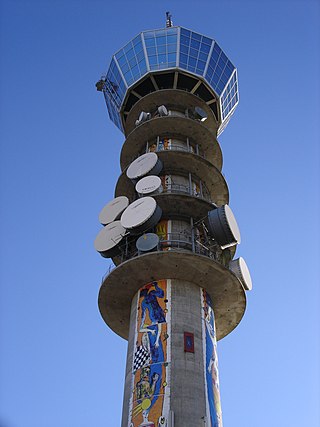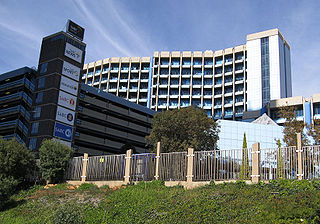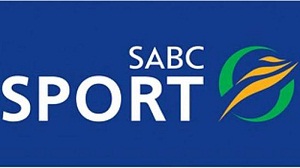International broadcasting consists of radio and television transmissions that purposefully cross international boundaries, often with then intent of allowing expatriates to remain in touch with their countries of origin as well as educate, inform, and influence residents of foreign countries. Content can range from overt propaganda and counterpropaganda to cultural content to news reports that reflect the point of view and concerns of the originating country or that seek to provide alternative information to that otherwise available as well as promote tourism and trade. In the first half of the twentieth century, international broadcasting was used by colonial empires as a means of connecting colonies with the metropole. When operated by governments or entities close to a government, international broadcasting can be a form of soft power. Less frequently, international broadcasting has been undertaken for commercial purposes by private broadcasters.

NHK World-Japan is the international arm of the Japanese public broadcaster NHK. Its services are aimed at the overseas market, similar to those offered by other national public-service broadcasters, such as the British BBC, France 24, or the German DW. Contents are broadcast through shortwave radio, satellite, and cable operators throughout the world, as well as online and through its mobile apps. NHK World-Japan is also available on DirecTV channels 322 and 2049. It is headquartered in Tokyo.

Radio broadcasting is the broadcasting of audio (sound), sometimes with related metadata, by radio waves to radio receivers belonging to a public audience. In terrestrial radio broadcasting the radio waves are broadcast by a land-based radio station, while in satellite radio the radio waves are broadcast by a satellite in Earth orbit. To receive the content the listener must have a broadcast radio receiver (radio). Stations are often affiliated with a radio network that provides content in a common radio format, either in broadcast syndication or simulcast, or both. The encoding of a radio broadcast depends on whether it uses an analog or digital signal. Analog radio broadcasts use one of two types of radio wave modulation: amplitude modulation for AM radio, or frequency modulation for FM radio. Newer, digital radio stations transmit in several different digital audio standards, such as DAB, HD radio, or DRM.

Deutsche Welle, commonly shortened to DW, is a German public, state-owned international broadcaster funded by the German federal tax budget. The service is available in 32 languages. DW's satellite television service consists of channels in German, English, Spanish, Hindi, Persian, and Arabic. The work of DW is regulated by the Deutsche Welle Act, stating that content is intended to be independent of government influence. DW is a member of the European Broadcasting Union (EBU).

The Hellenic Broadcasting Corporation, commonly shortened to ERT, is the state-owned public radio and television broadcaster of Greece.
Radio Canada International (RCI) is the international broadcasting service of the Canadian Broadcasting Corporation (CBC). Prior to 1970, RCI was known as the CBC International Service. The broadcasting service was also previously referred to as the Voice of Canada, broadcasting on shortwave from powerful transmitters in Sackville, New Brunswick. "In its heyday", said Radio World magazine, "Radio Canada International was one of the world's most listened-to international shortwave broadcasters". However, as the result of an 80 percent budget cut, shortwave services were terminated in June 2012, and RCI became accessible exclusively via the Internet. It also reduced its services to five languages and ended production of its own news service.

Television in South Africa was introduced in 1976. The country is notable for the late introduction of widespread television broadcasting.

The South African Broadcasting Corporation (SABC) is the public broadcaster in South Africa, and provides 19 radio stations (AM/FM) as well as six television broadcasts to the general public. It is one of the largest of South Africa's state-owned enterprises.
Free-to-air (FTA) services are television (TV) and radio services broadcast in unencrypted form, allowing any person with the appropriate receiving equipment to receive the signal and view or listen to the content without requiring a subscription, other ongoing cost, or one-off fee. In the traditional sense, this is carried on terrestrial radio signals and received with an antenna.

Radio Sonder Mense (RSG), i.e. Radio Without Borders, is an Afrikaans-language radio service run by the South African Broadcasting Corporation for the whole of South Africa. Since Afrikaans is one of South Africa's 11 official languages, the SABC is required to carry an Afrikaans-language service on both radio and television. RSG is the radio part of this Afrikaans-language service. RSG broadcasts mostly on FM utilizing transmitters owned and operated by Sentech, the former signal distribution division of the SABC.

The Voice of Vietnam is the Vietnamese national radio broadcaster. Directly run by the government of Vietnam alongside the Vietnam Television (VTV) and the Vietnam News Agency (VNA), VOV is tasked with promoting the policies of the Communist Party and the laws of the state.
LM Radio is a radio station based in Maputo, Mozambique. Historically it was a shortwave station broadcasting to South Africa and Rhodesia from Lourenço Marques, the colonial era name of Maputo, hence the name "Lourenço Marques Radio" from 1936 to 1975 when it was shut down by the government of the then newly independent country. In 2010, following political reforms and economic development in Mozambique a new station was launched with the brand "Lifetime Music Radio", trading on the nostalgia of the original LM Radio.

The Namibian Broadcasting Corporation (NBC) is the public broadcaster of Namibia. It was established in 1979, under the name South West African Broadcasting Corporation (SWABC).

Pretoria FM, formerly Radio Pretoria is an Afrikaans community-based radio station in Pretoria, South Africa. It broadcasts 24 hours a day in stereo on 104.2 FM in the greater Pretoria area. Various other transmitters in South Africa broadcast the station's content further afield, while the station is also available on Sentech's digital satellite platform. The station was founded seven months before the 1994 elections. From the start, it identified itself as a radio station for the Afrikaans speaking community. For a brief period, it broadcast informally from a makeshift studio east of Pretoria. Broadcasts were made possible with the help of among others, retired SABC employees. Post-1994, Radio Pretoria struggled for years to secure a permanent broadcasting license from the ANC government.

RTÉ Radio is a division and service of Raidió Teilifís Éireann (RTÉ), which broadcasts four analogue channels and five digital channels across Ireland and beyond.
Radio and TV broadcasting in Pretoria is supplied via a network of VHF/FM and UHF transmitters and repeaters owned and operated by Sentech - South Africa's state-owned broadcast signal distributor - from four transmitter sites in and around the city. A number of community radio stations operate transmitters from non-Sentech sites.
Family Broadcasting Corporation, formerly known as LeSEA Broadcasting, is an American Christian television network. Founded by Lester Sumrall in 1972, Family Broadcasting Corporation is headquartered in South Bend, Indiana, and broadcasts Christian and family programming. Peter Sumrall, son of Lester Sumrall, served as its president and chief executive officer from 2002 to 2015. His son, Drew Sumrall, now serves in the same position.

SABC SPORT is a South African free-to-air sports television channel owned by the South African Broadcasting Corporation (SABC).
AstraSat was the South African Broadcasting Corporation's satellite television service that existed between 1996 and 1998. AstraSat carried SABC's three terrestrial television networks and two additional free-to-air channels that were aimed at becoming subscription channels. Numerous factors including the reliance on analogue instead of digital led to its closure in February 1998.











